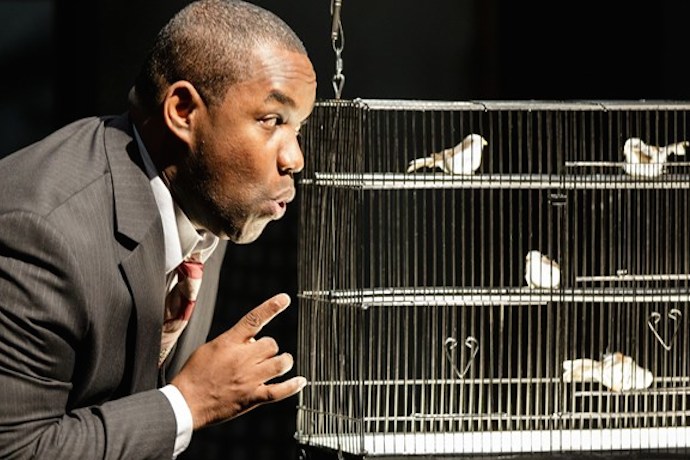Hackney Empire, London
By Richard Whitehouse
He may have been dead for almost twice as long as he lived, but Charlie Parker continues as a seminal influence on music and musicians – jazz or otherwise. Surprisingly, there had not been any stage-work about his life until Daniel Schnyder (Zurich-born and New York-based) took up the challenge with Charlie Parker’s YARDBIRD, first given two years ago and which receives its European premiere as the first production in what promises to be an enterprising collaboration between Hackney Empire, Opera Philadelphia and the Apollo Theater Harlem.
Schnyder’s admiration is never indulgent – the opera playing continuously over 93 minutes and encompassing all the salient events in Parker’s hectic life. His ‘Yardbird’ nickname is made the backdrop to images of jazz-greats, in what is the most arresting aspect of Ron Daniels’s staging. The action unfolds in flashback as Parker finds himself dead in a New York mortuary and returns to the Birdland jazz club to write his final masterpiece. From here we witness his upbringing in a Kansas City hostile to aspiring black youth, the fraught relationships with his three wives, meeting with trumpeter Dizzy Gillespie and their evolution of bebop, the sojourn in Los Angeles that brought artistic success but exacerbated his heroin addiction then saw his mental collapse and incarceration, then a final flourishing curtailed by his death when just 34.
All this is conveyed in music whose jazz overtones are shot-through with a nostalgic warmth. Unsurprisingly in a largely female cast, there are standout numbers for the women in Parker’s life and it maybe matters little that these are couched in an idiom closer to Gershwin or Blitzstein than to that of Parker. More questionable is the relative uniformity of pacing and texture, so that dramatic high points tend to be underpinned more by emotional rhetoric then by musical content. Most crucially the score, for all that saxophone is prominent in the mix, gives little idea of what Parker achieved as composer or musician. While elements from several of his tunes are heard, the generalized quality of Schnyder’s music limits any deeper identification: we sympathize readily with who Parker was but gain little understanding as to what he did.
That said, Bridgette A. Wimberly’s libretto is a model of sing-ability in allowing vocal lines of suppleness and eloquence. Best known for his bel canto repertoire, Lawrence Brownlee is superb in a title-role that pivots between elation and despair. Angela Brown is warmly emotional as Parker’s mother Addie, with Chrystal E. Williams, Rachel Sterrenberg and Elena Perroni hardly less impressive as his three wives – the uncomprehending Rebecca, the empathetic Chan and the resigned Doris. Julie Miller exudes wariness as the jazz patron Baroness Nica, while Will Liverman evinces a palpable humanity as Dizzy Gillespie. Clark Rundell secures a committed response from the reconstituted ENO Orchestra, in which any perceivable imbalance between the singers onstage and players in the pit is soon corrected.
Whatever its limitations, Charlie Parker’s YARDBIRD succeeds as an evocation of one whose tragic existence did not lessen his stature or limit his influence. In bringing this to the notice of present-day audiences, as the centenary of Parker’s birth nears, Schnyder deserves credit. ![]()
Further performances on June 13, 15 and 17. Box Office: 020 8985 2424 / hackneyempire.co.uk
